Almost all of kidney function in our body’s essential and vital, and for various violations of their normal operation, affects the majority of organs and systems of the human body.
Thanks to the activity of the kidneys, maintain the constancy of internal environment (homeostasis). When there is any irreversible pathological process in the body, the consequences of the disease becomes extremely severe, and sometimes fatal.
If to consider, what is the role of the kidneys in the human body and what are the processes of life support control, you first need to get acquainted with the peculiarities of the structure of all components of this organ (especially at the cellular level).
The anatomical and physiological structure of the body and its importance for the body
Kidney
Normal person from birth possesses two kidneys, which are located symmetrically from the spinal column in his thoraco-lumbar. In the event of anomalies in development, the child may be born with three or, on the contrary, one kidney.
The body has a bean-shaped form, and outside it is covered by the dense capsule consisting of connective tissue component. The outer layer is called the cortical substance of the kidneys, it takes up less space. The inner layer is called the “medulla”, it is based on the parenchymal tissue and stroma, which is abundantly pervade the renal vessels and nerve fibers.
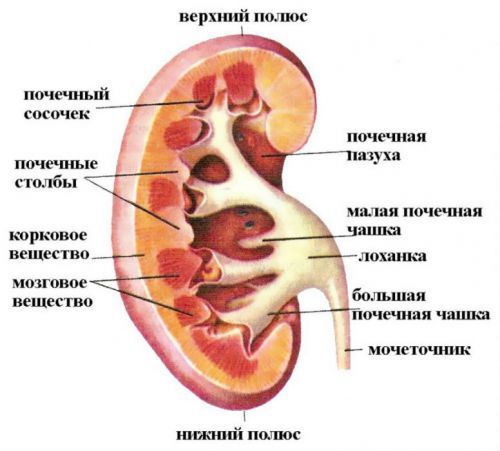
If you analyze the process of accumulation of urine in the simplified variant it looks as follows: small cups merge into each other, forming a large Cup, and those, in turn, form a system of the pelvis, and open into the lumen of the ureter.
Morphofunctional unit of the kidney is the nephron, which is responsible for most of the kidneys in the human body. All nephrons are closely connected and constitute a complex “smooth” movement.
In their structure there are the following structures:
- glomerular apparatus (malpighia body) located in the thickness of the cortical substance, whose main function is to filter incoming blood;
- capsule covering the glomerulus from the outside and performing the role of “filter” through which the blood is purified from any kind of toxins and products of metabolism;
- a complex system of convoluted tubules that merge into each other and allow the reverse absorption of the filtered liquid.
In the tissue of each kidney is at least 1 million actively functioning of nephrons
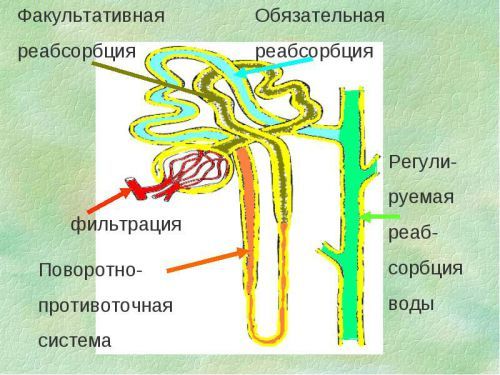
The work of all components of the nephron sequentially passes through three phases:
- Filtration of blood plasma with the formation of primary urine (occurs in the glomeruli). Per day through the kidneys, there are approximately 200 liters of urine so that its composition is close to human plasma.
- Reabsorption or the process of reverse suction necessary to ensure that the body is not lost with the urine of the necessary materials (this occurs in the tubules). Thus, delayed vitamins, important body salts, glucose, amino acids and other.
- Secretionin which all toxic products, unnecessary ions and other substances, delayed renal filter, go to the end of the urinary sediment and are allocated out forever.
The work of the renal unit is in constant mode, where one phase of the process gradually replaces the other
The adrenal glands
When it comes to the structure and function of the kidneys, not to mention the fact that on the upper pole of this body, there are special paired structures that are called adrenal glands. Despite the fact that they have small volume, the functionality of them unique and essential.
The adrenal glands consist of parenchyma and are coupled endocrine organ that defines their main purpose in the human body. The oppression of their work leads to a number of serious disorders that require immediate medical intervention. Among the most frequent diseases encountered specialist, allot such pathology, as hypoadrenalism (strongly inhibited production of certain hormones).
The function of the kidneys and adrenal glands
The main function for which you are responsible of the kidney is called the excretory is the ability to form and, subsequently, to allocate the end-product of metabolism, namely urine. In the medical literature, you can meet with the term “excretory” function that is synonymous with the previous process.
Urinary (or excretory) kidney function involves the filtration and secretory function, which was described above. Their main task is the removal of toxins from the body through the urinary sediment.
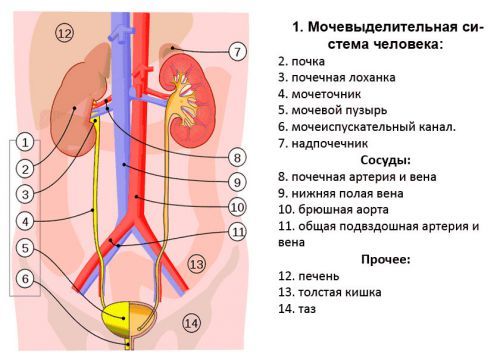
In the final urine contain “unnecessary” to the organism the products of his life
An equally important function of the kidneys is their ability to synthesis of hormonal substances.
Endocrine work of the authority associated with the receipt of blood hormones such as:
- renin (he is responsible for water balance in the body, and prevents the excessive secretion and controls the constancy of the blood volume in the circulatory line);
- erythropoietin (a substance that stimulates the production of erythrocytes in bone marrow cells);
- prostaglandins (control blood pressure).
Metabolic function of the body is that in its tissues, the synthesis of a series of biological substances or their transformation into active forms (for example, an inactive form of vitamin D in the kidneys changes its structure and becomes more active).
The kidney is able to maintain the balance of the ionic composition of the plasma and constant osmotic pressure in the body.
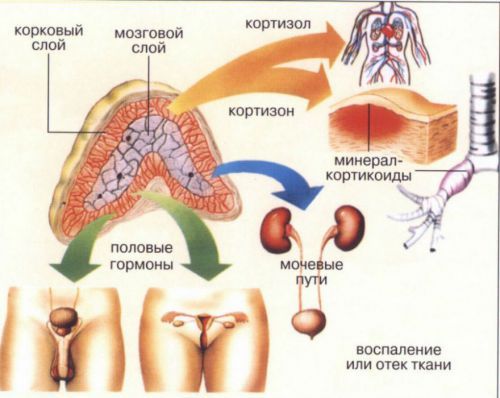
Concentration function of the renal apparatus lies in the fact that he is able to concentrate urine, namely increased release of dissolved substrates. When there is a failure in this function, on the contrary, increasing the allocation of water, and not substances. Thus, it reflects the functional ability of the kidneys.
The most important function of the adrenal gland are reflected in the following:
- They take a direct part in many metabolic and metabolic processes.
- Produce a number of vital hormonal substances that affect the individual systems of the body (basically, it’s the function of the adrenal cortex).
- Define the behavior and reaction of the human body in a stressful situation.
- Thanks to the adrenal glands, formed the response of the body to irritation from the outside.
The main function of the adrenal glands – synthesis of hormonal substances
Dysfunction of the
About possible causes and reasons for dysfunctions in the kidneys written the whole book, there are many syndromes, diseases and pathological conditions, which are a consequence of a breach of a particular organ function. They are all very important, no doubt, but we will try to highlight the most important points.
The main factors
When it comes to etiological factors, i.e. the causes that led to the kidney diseases, among them it is necessary to allocate following groups.
Prerenal mechanisms are due to processes that indirectly affect the functional activity of the organ.
These include:
- various kinds of mental States, disorders of the nervous system, which may result in the development of reflex urinary retention, up to complete her absence;
- pathology of endocrine nature, leading to disruption in the synthesis of hormonal substances that can affect the kidneys;
- violation of blood supply of the organ under General hypotensive processes (for example, during the collapse) or hypertensive crisis.
Renal mechanisms involve direct tissue damage of the kidney (inflammatory or autoimmune diseases, thrombosis, aneurysm or atherosclerosis of the renal vessels and others).
Postrenal mechanisms of damage are triggered when in the way of the natural flow of urine there are obstacles (blockage of the lumen of the ureter by the stone, compression by tumor process, etc.).
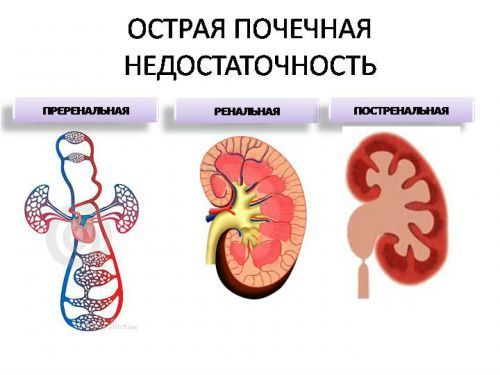
Principal acute renal failure
Mechanisms of development
When exposed to any of the above factors, violations occur associated with a change in the processes of filtration, reabsorption, or excretion.
Changes in the filter can occur:
- the decrease in the volume of plasma filtered at the glomerular apparatus (under hypotonic conditions, necrotic or sclerotic processes in the tissues of the glomeruli);
- the increase in the volume of filtered plasma (hypertonic condition, inflammatory processes leading to increased permeability of the glomerular membrane).
Changes in reabsorption are characterized by a slowing of this process that is most often associated with genetic abnormalities in the enzyme level.
Violation of excretion is manifested in the delay of toxic substances in the body and their adverse effects on the entire body, possibly with the glomerulonephritis of various etiology, ischemic kidney disease, and others.
The main manifestations
Kidney function is evaluated by the following characteristics:
- Indicators of diuresis, that is, the volume of urine during the day. Normal person produces a bit less urine than drink fluid, and pathology may develop polyuria, oliguria or anuria.
- The density of urinary sediment (normal ranges from 1008 to 1028). In pathology talking about gipermenoree, hyposthenuria or isosthenuria.
- The components included in the composition of urine and their relative proportions (we are talking about leukocytes, erythrocytes, protein, cylinders, etc.).
Functional operation of kidneys is evaluated by a number of diagnostic criteria for urinary sediment
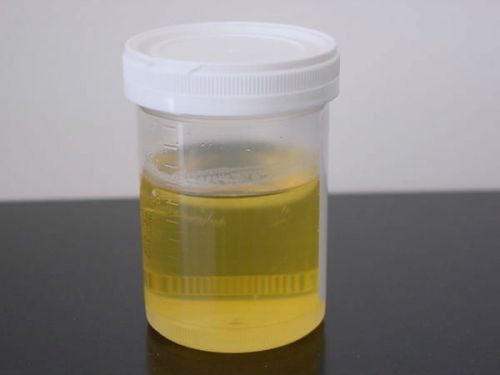
Renal failure – is a complex of symptoms and syndromes, the development of which is caused by reduction or complete cessation of urine output. The accumulation of toxic metabolic products, which “poison” the body.
Acute process developing within a few hours, and the main feature of it is the progression of the disorder all the processes of life.
Chronic failure may develop many years, this is due to the gradual loss of nephrons.
Treatment
To restore impaired function of the renal unit, resort to etiotropic and pathogenetic therapy, but do not forget about symptomatic treatment.
Causal treatment involves the complete elimination or maximum correction of all causes, that is the source of the disease.
Principles of pathogenetic treatment are to blockade certain parts of the disease that allows you to start the recovery of renal function and their natural work. For this purpose, use of funds can inhibit the immune system, or, conversely, stimulating protective properties of the organism, perform hemodialysis and others.
Symptomatic therapy includes a huge range of medicines, restorative and corrective effects to kidney failure (hypertensive, diuretic drugs, etc.).



